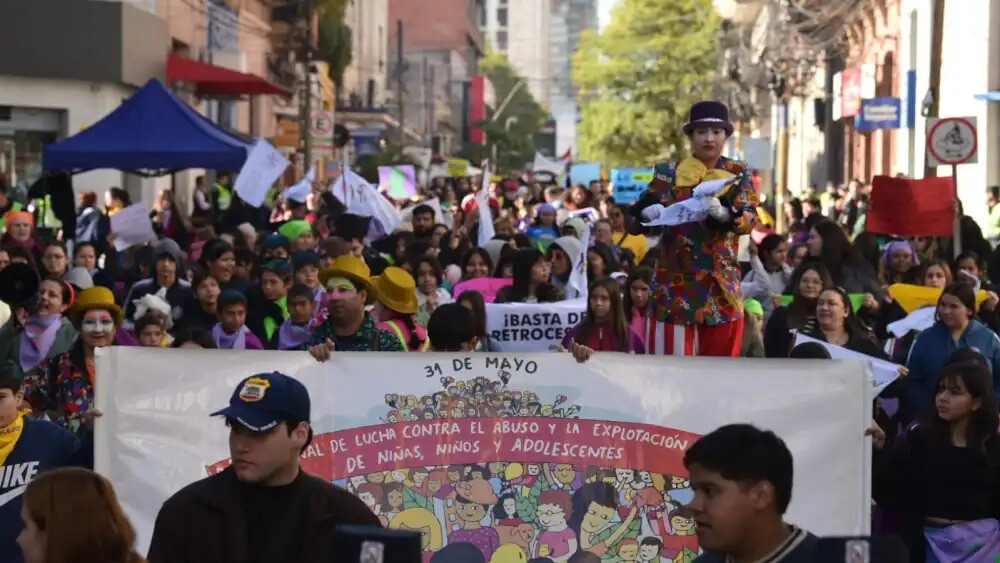
Last Saturday, a large-scale demonstration was held in Asunción, the capital of Paraguay, to commemorate the 'Day Against Sexual Abuse and Exploitation of Children and Adolescents' and call for an end to violence against minors. Expressing grave concern over alarming statistics, various civil society organizations and children and adolescents strongly urged the state to establish preventive policies and ensure just legal protection for victims.
Unending Tragedy: Over 3,500 Reported Cases Met with Insufficient State Response
Fernando Acosta, spokesperson for the 'Movement Against Sexual Violence Towards Children and Adolescents (Movimiento contra la Violencia Sexual hacia Niños, Niñas y Adolescentes),' who participated in the protest, raised his voice, stating, "Today we gather to demand that the rights of children and adolescents be fully guaranteed by the state." He highlighted the severity of the problem, emphasizing that over 3,500 cases of child sexual abuse were reported to the Public Prosecutor's Office in 2024 alone, a trend that continues this year.
Acosta, speaking through journalist Liz Acosta, criticized the state's significant shortcomings in prevention, protection, and victim compensation policies. He also strongly condemned certain politicians' remarks and legislative attempts that seem to normalize violence against children and adolescents. In particular, he expressed clear opposition to legislative moves to abolish the Ministry of Children and establish a Ministry of Family, fearing it could weaken children's independent rights and protections.
"We Are Not Afraid": Children and Adolescents Claim Their Rights
As the final act of the protest at Juan E. O'Leary Square, participants issued a statement outlining their positions. The youth who read the statement declared, "We march because we are not afraid. Our bodies are precious, our voices are important, and our lives deserve to be lived with dignity and without violence." They further stated, "We are here today because Felicita is absent, and so many others are absent. We do not want to increase the number of absences," mentioning and commemorating the names of tragically sacrificed children and adolescents.
Above all, they strongly demanded that the state listen to their voices. Given the high incidence of child sexual abuse, the opinions of children and adolescents must be reflected in policy-making processes. They firmly asserted, "We no longer want empty words that say 'we don't touch children,' but then exclude us from discussions about policies that are supposed to protect us." They continued, "Substantive participation is our right, and we demand that it be realized."
They also delivered a message to society as a whole, appealing for more people to join this fight and refrain from repeating hate speech that particularly harms vulnerable groups. They emphasized that violence against children and adolescents is not a problem for a specific group but a societal issue that must be addressed collectively, encouraging active citizen participation.
"Normalizing Silence is Unacceptable": Medical Professionals Also Raise Their Voices
The Paraguayan Society of Obstetrics and Gynecology of Childhood and Adolescence (Sociedad Paraguaya de Obstetricia y Ginecología de la Infancia y Adolescencia) also expressed deep concern over the 'normalization of silence,' 'impunity,' and the 'absence of effective protection mechanisms.' They emphasized the mandatory and continuous training of professionals in the medical field, early detection of child sexual abuse, and appropriate accompaniment for victims as essential.
The Society also called for universal and confidential access to sexual and reproductive health services based on a rights-centered approach and the best interests of the child. Furthermore, they underscored the importance of prompt and undelayed justice, making it clear that the healthcare system must function as a safety net for victims of child sexual abuse.
Legal students also participated in the protest, expressing support for the case of Arine, a teenager who suffered sexual abuse within her family since the age of five. Lawyer Víctor Casanova announced that Arine's case would be brought before the Inter-American Commission on Human Rights and ultimately referred to the Inter-American Court of Human Rights. This demonstrates a commitment to seek international assistance to ensure the human rights of child abuse victims if judicial resolution within Paraguay proves difficult. Arine's case is seen not merely as an individual tragedy but as a symbolic event that reveals the limitations of the Paraguayan judicial system and the urgency of child protection.
This protest served to once again alert Paraguayan society to the severity of child and adolescent abuse and conveyed a powerful message that the state and civil society must unite to take concrete action to ensure the safety and rights of children and adolescents.
[Copyright (c) Global Economic Times. All Rights Reserved.]






























